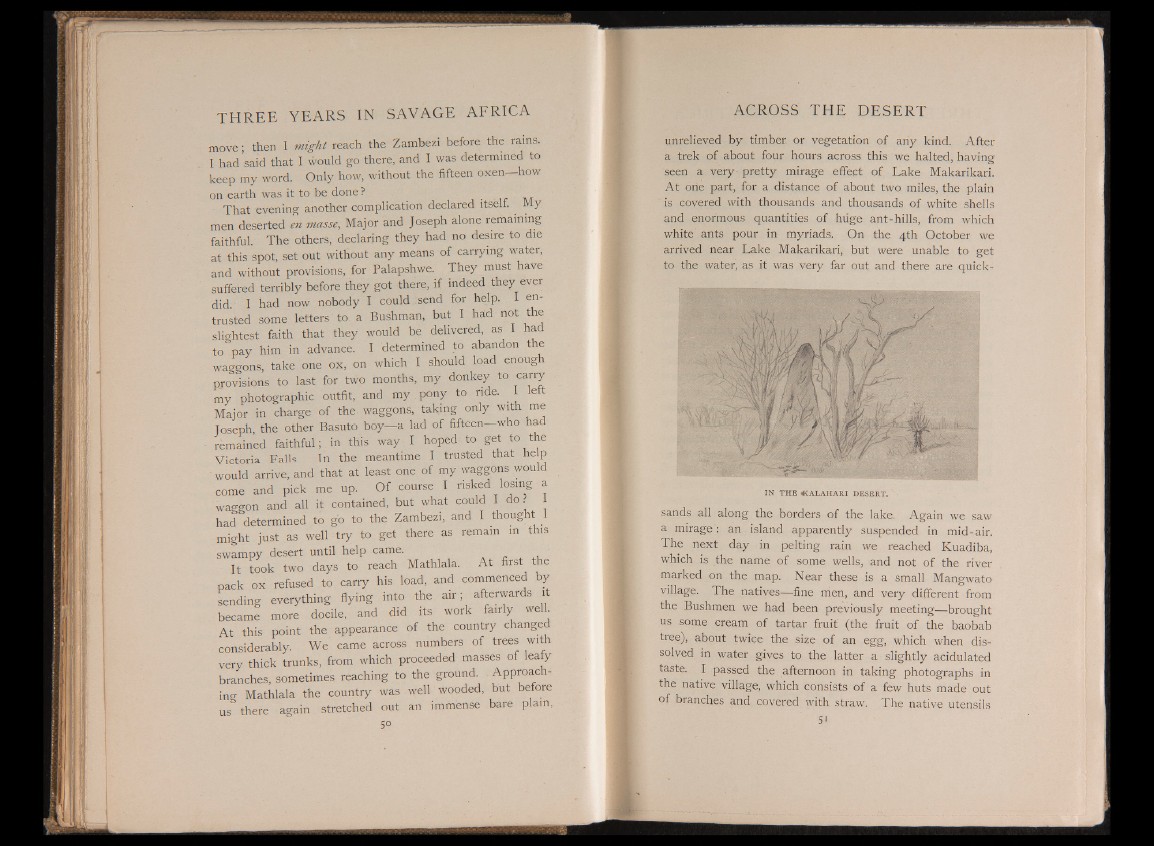
move; then I might reach the Zambezi before the rains.
I had said that I would go there, and I was determined to
keep my word. Only how, without the fifteen oxen-how
on earth was it to be done ?
That evening another complication declared itself. ^ My
men deserted en masse, Major and Joseph alone remaining
faithful. The others, declaring they had no desire to die
at this spot, set out without any means of carrying water,
and without provisions, for Palapshwe. They must have
suffered terribly before they got there, if indeed they ever
did. I had now nobody I could send for help. I entrusted
some letters to a Bushman, but I had not the
slightest faith that they would be delivered, as I had
to pay him in advance. I determined to abandon the
waggons, take one ox, on which I should load enough
provisions to last for two months, my donkey to carry
my photographic outfit, and my pony to ride. ^ I left
Major in charge of the waggons, taking only with me
Joseph, the other Basuto boy—a lad of fifteen—who had
• remained faithful; in this way I hoped to get to the
Victoria Falls. In the meantime I trusted that help
' would arrive, and that at least one of my waggons would
come and pick me up. Of course I risked losing a
waggon and all it contained, but what could I do .
had determined to go to the Zambezi, and I thought 1
might just as well try to get there as remain m this
swampy desert until help came. •
It took two days to reach Mathlala. At first the
pack ox refused to carry his load, and commenced by
sending everything flying into the a ir; afterwards it
became more docile, and did its work fairly well
At this point the appearance of the country changed
considerably. We came across numbers of trees with
very thick trunks, from which proceeded masses of leafy
branches, sometimes reaching to the ground Approaching
Mathlala the country was well wooded, but before
us there again stretched out an immense bare plain,
So
unrelieved by timber or vegetation of any kind. After
a trek of about four hours across this we halted,7 havinsor
seen a very' pretty mirage effect of Lake Makarikari.
At one part, for a distance of about two miles, the plain
is covered with thousands and thousands of white shells
and enormous quantities of huge ant-hills, from which
white ants pour in myriads. On the 4th October we
arrived near Lake Makarikari, but were unable to get
to the water, as if was very far out and there are quick-
IN TH E K A L A H A R I DESERT.
sands all along the borders of the lake. Again we saw
a mirage: an island apparently suspended in mid-air.
The next day in pelting rain we reached Kuadiba,
which is the name of some wells, and not of the river
marked on the map. Near these is a small Mangwato
village. The natives—fine men, and very different from
the Bushmen we had been previously meeting—brought
us some cream of tartar fruit (the fruit of the baobab
tree), about twice the size of an egg, which when dissolved
in water gives to the latter a slightly acidulated
taste. I passed the afternoon in taking photographs in
the native village, which consists of a few huts made out
of branches and covered with straw. The native utensils
51